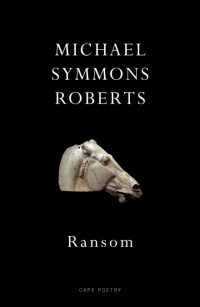Ransom (Shortlisted, TS Eliot Prize 2021)
‘A Man will be imprisoned in a room with a door that’s unlocked and opens inwards; as long as it does not occur to him to pull rather than push’.
Ludwig Wittgenstein
Far-reaching in his enquiry, Michael Symmons Roberts in Ransom, his eighth published collection of poetry, addresses some fundamental issues about human nature – who and what guides us, and in turn keeps us in thrall. Some poems have a more traditional meditative rendering while others tend more toward the performative, riffing off contemporary themes about living in the city. Yet, all are united by the ubiquitous theme of ransom. Jeanette Winterson has monikered Roberts as a religious poet for the secular age. Reading through the sequences in this collection, I can see why for it understands ransom as levied on us by how we live now, the creeds we might follow, our education, to say nothing about the cultural and ethical legacies of the past.
‘Ware’ conjures up its own idea of ransom through variegated imagery:
think of this malicious code
as pondweed […]
holds you closer every time you kick.
And, engendering thoughts of, perhaps, Robert Frost yoked to tradition, nature and the weather, and more:
spring spent mending fences,
eyes on winter
and the warning cry of freeze.
In ‘Episodics’, there is an intense last loving remembrance of his father,
not you
this is not your face
sudden tipped
against the wing of your chair
as if in sleep
in a tranche of poetry that is right-justified. Translocated lines, ragged to hard edges, reflect a change in poetic tone and move through a litany of this and that, ‘rosary of pointless calls’ saved on the answering machine. ‘[S]till we have your voice/in amber’ Roberts writes, memories that ‘scatter to the edges/of each room/in search of cracks knot-holes’ (remembrances, which remind me of Eavan Boland’s ‘Amber’ and Elaine Feinstein’s ‘Dad’).
In ‘Vingt Regards’, named for Olivier Messiaen’s war-time symphony, Roberts captures the mood of occupied Paris which in ‘Gaze of Time’ observes,
the street-sounds lift a semi-tone
a disappointed waiter moans
about a tip, I catch his words
as chittering of moth-sized birds.
A different context, a different narrative no less polyphonic than Messiaen through its metrical patterning and end rhymes, its sonic manipulations.
Every poem offers something different, a facet of an idea in which ‘Acceptance of necessity/is not enough to set me free’ (‘Fireflies’). Fortunately, Michael Symmons Roberts doesn’t leave his reader to flounder and provides helpful endnotes for our full understanding and enjoyment of his poetic terrain.
‘I Saw Eternity The Other Night’, which unlike Henry Vaughan’s ‘ring of pure and endless light’ reveals nothing other than the hopeless void of repeating screens:
the street outside turned mirror
and my eyes reflected back as clear,
[…] one vast flawless empty screen
of screen in screen in screen in screen [.]
Roberts pays homage to Hopkins in ‘Custody of the Eyes’ in a re-enactment of the excruciating infliction on the body (and the mind) of never taking his eyes off the ground:
how do you choose
the moment to uncrick your neck,
to lift your head’s dead weight[.]
This act of looking down until you allow yourself to look up, this act of self-denial emblematic of much of Hopkins’ poetry is carried by Roberts onto the fell. And how in a single dog-bark this ransacked soul can be saved. Made to look up!
In the end, Roberts reflects with ‘gratitude’ on the double-bind of civic values, in one of several short poems in ‘Takk’,
Above us roars
the Mancunian Way, but underneath its flyover
We live rainless and at liberty [.]
Ransom is a complex reading experience which resonates on many different levels.
William Hume


Leave a Reply